| Reviews & Columns |
|
Reviews DVD TV on DVD Blu-ray 4K UHD International DVDs In Theaters Reviews by Studio Video Games Features Collector Series DVDs Easter Egg Database Interviews DVD Talk Radio Feature Articles Columns Anime Talk DVD Savant Horror DVDs The M.O.D. Squad Art House HD Talk Silent DVD
|
DVD Talk Forum |
|
|
| Resources |
|
DVD Price Search Customer Service #'s RCE Info Links |
|
Columns
|
|
|
Paris, Texas
The Criterion Collection // R // January 26, 2010
List Price: $39.95 [Buy now and save at Amazon]
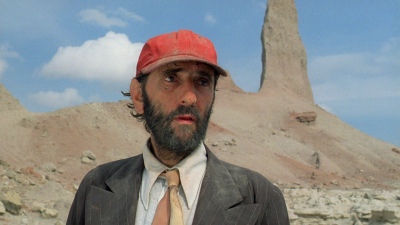 |
| [click on the thumbnail to enlarge] |
As we're first introduced to Travis, he's as blank a slate as the barren tract of land in that photograph he carries in his pocket. Wearing jeans, a jacket covered in dust, and a tattered red baseball cap, Travis shambles through the desert, eventually stumbling into a backwater diner and collapsing. Travis is hurriedly taken to a clinic, but the doctor looking over him isn't quite sure what to make of it all. This catatonic man appears to be incapable of communication and isn't carrying any sort of ID. The only clue to his identity at all is a crumpled phone number he's kept tucked away. The doctor rings it up and reaches Walt (Dean Stockwell), a reasonably successful billboard man out in sunny California. Walt had assumed his brother had long since died; even though it's an impatient doctor with a thick Bavarian accent on the other end of the line, this is the first he's heard of his brother in four years. Walt makes his way to this hopelessly obscure speck on the map as quickly as he can. Travis isn't looking to be rescued, though. Before Walt can even return to their dingy motel room with a clean set of clothes, Travis has once again vanished. Though Walt quickly catches up with his brother, Travis remains either unwilling or unable to speak. He panics when stepping foot on airplane and is baffled by the concept of taking a different rental car the rest of the way to Los Angeles. This broken man is far removed the Travis that Walt once knew, and though he is soon speaking again, he's not yet ready to explain where he'd spent the past four years.
Travis briefly settles into life in Walt's suburban Los Angeles home. Not quite knowing what to do with himself, he takes to collecting every shoe in the house and polishing them. The family has a maid on the payroll, but he washes dishes just the same. He has enough masculine pride that he wants to seem useful to the family somehow, at least. In the same way that Walt is unable to reach his brother, Travis too is having difficulty reconnecting with his son Hunter (Hunter Carson) -- a 7-year-old who doesn't even remember the father who abandoned him half his life ago, looking instead at his aunt and uncle as his parents. Travis never gets around to confiding in his brother about these missing years. He does resculpt himself into at least looking like the father he believes he ought to be, though, and it's enough for Hunter to feel some measure of pride at looking him in the face again. When Travis discovers that his wife
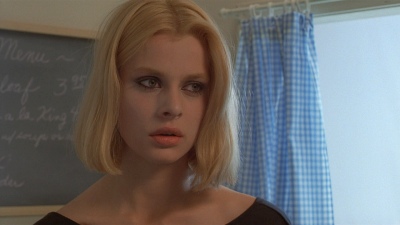 |
| [click on the thumbnail to enlarge] |
Two brothers drive from Texas to California; one of them turns around shortly thereafter and drives back with his son. The core of Paris, Texas' premise is certainly straightforward enough, but what Wim Wenders and collaborators L.M. Kit Carson and Sam Shepard sketch in the margins is anything but simple. Wenders knows what his film is about and avoids being distracted by the inessential. Paris, Texas isn't littered with meandering subplots or an undue emphasis on insignificant supporting characters. From the moment these two brothers reconnect for the first time in four years, the camera never wanders far from Travis. Not a line of dialogue is unnecessary or overwritten. It's a film devoid of artificial drama. There is no hero. There is no villain. In lesser hands, the character of Jane at best may have amounted to a MacGuffin but more likely would've become an exaggerated cariacture to hiss at: either a weak-willed nub of a woman or an insufferable monster beyond redemption. This isn't at all the case here. Paris, Texas renders its characters with intelligence, warmth, and respect, and Wenders treats his audience much the same way. This is a film with powerful emotions but no overt sentimentality; there isn't the sense of a guiding hand expressly informing the viewer how he or she is supposed to feel. Its themes and messages are largely left open to interpretation, and as straightforward as Paris, Texas may be in so many ways, its imagery and characters are rich enough to be endlessly analyzed and dissected. This isn't a film that, once its end credits begin to make their upward crawl, is forgotten about; it both demands and rewards thought and discussion.
Before setting out to review this Blu-ray disc, I knew little about Paris, Texas beyond its reputation. I was immediately enthralled, engaged in large part because the opening act of the film revolves around a mute character wandering through the desert and, we soon learn, had been missing for years. Not only could I not predict what twists and turns the film would take from there, but I wasn't even sure what sort of man Travis would turn out to be. Prolific character actor Harry Dean
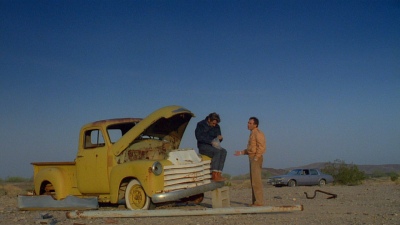 |
| [click on the thumbnail to enlarge] |
Aside from its deceptively simple premise, a spectacular cast, and emotional resonance, Paris, Texas also benefits greatly from a keen visual eye. The film draws much of its strength through its imagery: the emotions evoked from the stark landscapes of the desert and rickety small towns, yes, but also from their juxtaposition with the steel and glass of downtown Houston...of a posh suburban home in the San Fernando Valley. Paris, Texas is a remarkably beautifully photographed film, and considering how artfully composed this gorgeous imagery so frequently is, it's somewhat unexpected to hear it stated in the extras on this disc that Wenders deliberately didn't plan out his shots in advance. Paris, Texas is so masterfully crafted that it'd be enthralling on most any format, but the cinematography translates so spectacularly well to high definition that it's an especially rewarding discovery on Blu-ray. Highly Recommended.
Video
Benefitting from the keenly cinematic eye of Robby Müller and the sort of care and consideration expected from Criterion, it comes as little surprise that Paris, Texas looks gorgeous in high definition. Its palette feels entirely natural yet is still often bright and eye-catching. The photography is somewhat grainy and a touch soft, as expected for a film lensed in the early 1980s, although clarity and detail nearly always trump anything DVD could hope to deliver. Texture and fine detail are particularly striking when the camera closes in more tightly, and this presentation of the film isn't marred by any perceptible speckling or wear. There is ringing around quite a few edges, but considering that these same artifacts are present in some of the extras on this disc that have been culled from entirely different source material, I strongly suspect that this dates back to the original photography. One office building in a Houston backdrop suffers from some shimmering in the pattern of its windows, but this is the only such flaw that caught my attention throughout Paris, Texas' nearly two and a half hour runtime. A couple of other brief shots that struck me as unusually soft are explained away by Wim Wenders in his audio commentary as resulting from his choice of lens or an unfortunate lighting decision. These brief moments are easily dismissed. Paris, Texas is a beautifully photographed film, and it's greatly appreciated that it has arrived on Blu-ray looking this wonderful.
Paris, Texas is presented on Blu-ray at an aspect ratio of 1.78:1, and its AVC encode spans both layers of this BD-50 disc. This transfer was supervised and approved by Wim Wenders.
Audio
Although
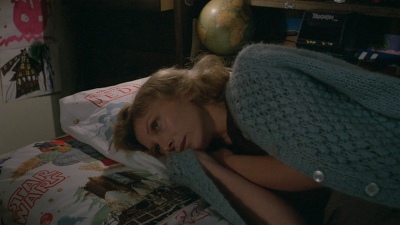 |
| [click on the thumbnail to enlarge] |
This comes as a disappointment since Paris, Texas in all other ways sounds terrific. The longing quality of Ry Cooder's stripped-down score is reproduced masterfully on this lossless soundtrack, and bass response is rich and resonant when appropriate. The dialogue and sound effects sound slightly dated but not to any greater extent than I'd expect, and they're rendered reasonably cleanly and clearly throughout the duration of the film. Some mild hiss is sporadically present but isn't nearly enough to distract. Paris, Texas is anything but unlistenable on Blu-ray -- I'm impressed by the clarity and full-bodied sound, really -- but viewers may be better off forcing their receivers to output in stereo rather than listening to this clumsy remix as-is.
Commentary aside, there are no alternate soundtracks on this Blu-ray disc. Subtitles are optionally offered in English.
Extras
All of the extras on this Blu-ray disc are encoded in high definition, although the majority of them are upscaled from lower resolution sources.
- Deleted Scenes (24 min.; SD): This sizeable reel of deleted scenes is more heavily oriented around the first act of the film, delivering additional spectacular helicopter shots of the desert, quite a bit more time spent with Travis at the timbuktu clinic, and more moments with Walt trying to bond with his brother on the drive back to Los Angeles. Some of the imagery here is phenomenal, particularly a sequence that frames an aging cemetery against a spiderweb of concrete overpasses. Also featured are some improvised banter between Hunter and Travis, a follow-up to Walt and his wife learning of Travis' departure with his son, a moment with a harmonica that was Wim Wenders' most difficult cut to have to make, and an unspoken goodbye. One intriguing aspect to this lengthy reel is that it captures some of the candid moments between takes: a quick back-and-forth between Wim Wenders and Harry Dean Stanton, for instance, as well as a peek at Wenders crawling out from the bottom of the frame during a driving sequence. Wenders offers optional commentary over this footage, and his delight at some of the compositions he discovered is infectious.
- Super 8 Footage (7 min.; SD): The
Super 8 home movie excerpted in the film is offered here in its entirety. Music is placed over this footage by default, but a press of the 'Audio' button switches to a monologue of Travis'.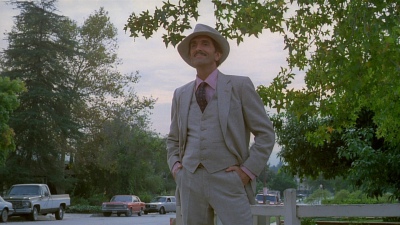
[click on the thumbnail to enlarge]
- The Road to Paris, Texas (43 min.; SD): Filmed in 1989, this retrospective devotes half of its runtime to exploring the early years of Wim Wenders' career as a director, and the remainder delves into Paris, Texas at length. As its title suggests, the documentary places particular emphasis on Wenders' Road trilogy as well as the thoroughly unpleasant introduction to American filmmaking that inspired The State of Things. Throughout these moments, Wenders touches on how he forged his identity through American rock-'n-roll, differentiates between the business of film in Europe and America, and describes how he decides if he ought to shoot one of his productions in black-and-white or in color. The second half of the retrospective is devoted entirely to Paris, Texas, and quite a number of the cast and crew are given an opportunity to participate. Harry Dean Stanton in particular is a standout, describing how he and his young co-star bonded over a styrofoam cup of a water as well as noting how he still isn't convinced about the conclusion of the film. Among Wenders' notes are his inability to craft endings and the shaping of Ry Cooder's stripped-down score. It's also a pleasant surprise to see that, aside from Wenders' collaborators on Paris, Texas, this retrospective also interviews the likes of Wings of Desire's Peter Falk and Ripley's Game author Patricia Highsmith. Those who only have time to watch a handful of the extras on this disc would be best served by starting here.
- Cinéma Cinémas (12 min.; SD): This 12 minute segment from a 1984 episode of the French program catches up with Wenders during post-production. We at first meet up with him as he and Ry Cooder are collaborating, and from there Wenders discusses the role of rock music not as an accent in his films but as a primary character, collaborating with Sam Shepard, and Paris, Texas marking the first time he'd been completely satisfied with one of his films. There's something appropriate that the bulk of the interview takes place on the road.
- Wim Wenders Interview (29 min.; HD): Recorded in 2001, the second of the more visually-oriented conversations with Wenders on this disc casts a considerably wider net. Wenders speaks about how he considers Paris, Texas to be his second film despite his sizeable body of work up to that point, taking a more freewheeling approach that eschewed storyboarding or meticulous planning, building the project from the ground-up with a blank page and a first-time screenwriter, and marveling at the sheer volume of talent he'd managed to assemble. Wenders also touches on the confidence that compelled him to start production despite only having half of the screenplay complete, delving into what the finalé represents, applauding Harry Dean Stanton's memorization of a twenty page monologue he was hellbent on having delivered in a single complete take, and noting the enduring influence of Paris, Texas despite its frustratingly limited success in certain countries, particularly on these shores.
- Claire Denis Interview (20 min.; HD): Wenders' 1st A.D. on Paris, Texas went on to become an accomplished director in her own right, and among the highlights of this newly recorded interview are Wenders joining the teamsters to avoid hiring a union driver, the director convincing Denis to work alongside him as she was just starting to put together her own project, helping to buy Lounge Lizard John Lurie an appropriately sleazy suit with her per diem, the blazingly fast scoring session with Ry Cooder, and a peep show devoid of any real sexuality. It's a terrific interview and is teeming with personality.
- Alison Anders Interview (23 min.; HD): The same holds true for this interview with Alison Anders, a production assistant on Paris, Texas who too went on to enjoy a great deal of success as a director. This segment alternates between personable interviews and readings from a diary that Wenders asked her to keep during production. The conversation with Anders includes the close bond struck with Wenders over her weekly fan letters, informing Harry Dean Stanton and Dean Stockwell's performances with her teenaged experiences with catatonia, bonding with Nastassja Kinski over her pregnancy, and pointing to Paris, Texas as the beginning of the American independent film
movement.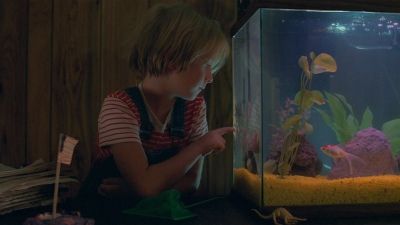
[click on the thumbnail to enlarge]
- Audio Commentary: Wim Wenders contributes an engaging commentary track, although quite a few of its highlights have already been addressed in the disc's other interviews and featurettes. Among the topics of discussion here are the advantages of shooting so many of the film's earliest scenes in chronological order, that Paris, Texas was a title that grew organically from the screenplay, and delving in-depth into a somewhat uncomfortable ending that breaks from the traditional mold. Despite the daunting length of the film, the charming Wenders has no difficulty at all maintaining the momentum throughout the entirety of Paris, Texas. Those fascinated with the technical end of filmmaking ought to appreciate his detailed notes about the photography, particularly as the movie draws to a close. This commentary track is a rewarding listen, dulled only by the fact that the extras throughout the rest of the disc are so comprehensive as well. Of course, others may find it worth a spin just to hear Wenders quote a Missing Persons lyric.
- Galleries (HD): Paris, Texas features more than forty breathtakingly beautiful photographs across its pair of high resolution still galleries. The larger of the two is culled from Wim Wenders' search through the Southwest for visual inspiration, and Robin Holland offers seventeen shots snapped while production was underway.
- Trailer (2 min.; SD): The last of the extras is a grainy theatrical trailer from Fox's domestic release.
The Final Word
Paris, Texas is a great many things: beautifully photographed, outstandingly well-acted, warmly funny, and emotionally resonant. Its greatest strength, perhaps, is its sincerity. Wim Wenders and his collaborators dispense with any trite plot points or standard issue archetypes. This is a film that's so thematically rich, boasts such wonderfully realized characters, and is so visually entrancing that despite the fact that very little happens in terms of plot, Paris, Texas' grip remains unrelenting from its first frame to the last. Perhaps benefitting from the perspective of an admiring foreigner, Paris, Texas is one of the great films about America, and its enduring influence on both music and film cannot be overstated. Aside from a partially bungled but still entirely listenable soundtrack, Paris, Texas has been lavished with an otherwise first-rate release on Blu-ray, making for one of the most enthusiastically recommended titles of Criterion's already spectacular slate of high definition releases. Highly Recommended.
|
| Popular Reviews |
| Sponsored Links |
|
|
| Sponsored Links |
|
|
| Release List | Reviews | Shop | Newsletter | Forum | DVD Giveaways | Blu-Ray | Advertise |
|
Copyright 2024 DVDTalk.com All Rights Reserved. Legal Info, Privacy Policy, Terms of Use,
Manage Preferences,
Your Privacy Choices | |||||||













